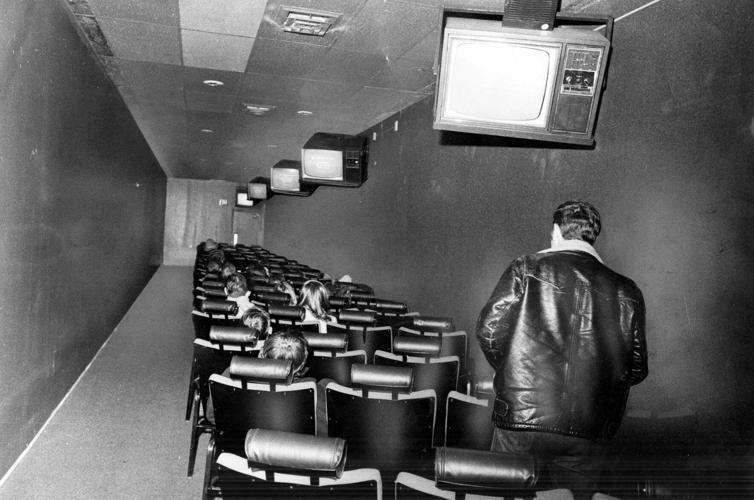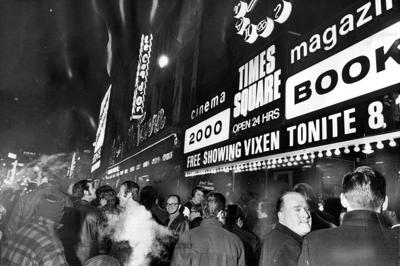When the Fox Theatre screened Russ MeyerŌĆÖs 1968 ŌĆ£VixenŌĆØ last February, the sexploitation satire ŌĆö about a voluptuous woman with a unquenchable erotic appetite ŌĆö played without incident. No complaints from the 31 attendees. No visits from the police.
It was a different story when ŌĆ£VixenŌĆØ ran for five weeks in early 1970 at Cinema 2000, a Yonge Street theatre that showed movies on video monitors to avoid the oversight of the Ontario Censor Board.
Because videotape was a recent technology, it wasnŌĆÖt covered by the Theatres Act, which governed the Censor Board and regulated the film industry.┬Ā
Still, on March 3 of that year, days after obscenity charges were laid against the theatreŌĆÖs owners, Cinema 2000 held a free screening of the movie, inviting the audience to decide if it was indeed obscene. Before the filmŌĆÖs climax, police stopped the screening and seized the tape, forcing 200 people onto Yonge Street on a cold winter’s night.
ŌĆ£They forgot to put (video) in the Act, and I think thatŌĆÖs why we were so successful,ŌĆØ Max Allen, who opened Cinema 2000 in September 1969, told the Star. ŌĆ£VixenŌĆØ reportedly grossed more than $84,000 during that run.
At the same time, the nearby LoewŌĆÖs Yonge Street Theatre was screening the taboo-breaking Swedish film ŌĆ£I Am Curious (Yellow),ŌĆØ which had been approved by censors after 57 seconds were cut. ŌĆ£Vixen,ŌĆØ with its copious nudity and simulated soft-core sex, had been playing uncensored.

Erica Gavin stars in “Vixen,” Russ Meyer’s breakthrough movie.
Severin FilmsTwo trials later, Allen ŌĆö who had distanced himself from the theatre ŌĆö was acquitted. Time Square Cinemas Ltd., which ran Cinema 2000, was found guilty of staging an indecent performance and fined $1,000.
The controversy made it to the provincial legislature. When politicians debated whether to include videotape under the Theatres Act, NDP MPP Stephen Lewis interjected: ŌĆ£Why donŌĆÖt you discuss the abolition of the Board of Censors instead?ŌĆØ
Designed to resemble an airplane interior, Cinema 2000 featured televisions hanging from the walls, running on a closed-circuit system. Its space-age technology was visible from the street. ŌĆ£We had all this gadgetry in the window,ŌĆØ Allen says. ŌĆ£And it didnŌĆÖt work at all. The machinery would fail every 20 minutes.ŌĆØ

Yonge Street’s Cinema 2000 showed movies on TV monitors to avoid the censors.
Fred Ross/╬┌č╗┤½├Į Star file photoNow 86, Allen sits in his ╬┌č╗┤½├Į home holding the new Blu-ray edition of ŌĆ£Vixen.ŌĆØ ŌĆ£I almost went to jail over this movie,ŌĆØ he said. Then, as now, he wonders what the fuss was about.
ŌĆ£Have you seen the film?ŌĆØ he asked.
The immortal Mr. Meyer
Long before pioneering the American sex film with 1959ŌĆÖs ŌĆ£The Immoral Mr. Teas,ŌĆØ Russ Meyer had worked as a Second World War cameraman and honed his skills on industrial films. In the 1950s, he photographed early Playboy pictorials, before devoting his life to making overstuffed and overheated comedies and melodramas starring buxom women.
ŌĆ£ThatŌĆÖs what heŌĆÖs known for,ŌĆØ said David Gregory, co-founder of Severin Films, an indie producer and home video label. ŌĆ£But itŌĆÖs a bit more complicated than that.
ŌĆ£He is the true American independent filmmaker. He is the writer, cinematographer, editor, director and distributor. He even answered his phone at the office. John Cassavetes didnŌĆÖt do all of that.ŌĆØ
This year Severin has released five major Meyer restorations, including ŌĆ£Vixen,ŌĆØ 1975ŌĆÖs ŌĆ£SupervixensŌĆØ and 1979ŌĆÖs ŌĆ£Beneath the Valley of the Ultra-Vixens.ŌĆØ The latest two ŌĆö 1965ŌĆÖs ŌĆ£MotorpsychoŌĆØ and 1976ŌĆÖs ŌĆ£Up!ŌĆØ ŌĆö came out this week.
Film historian Elizabeth Purchell, who contributed audio commentaries to both new releases, calls Meyer a consummate showman. ŌĆ£If a film didnŌĆÖt work the first time around, he would release it under a different title and a different campaign,ŌĆØ she said. ŌĆ£And unlike other early independent films, which are very rough around the edges, MeyerŌĆÖs films were always immaculately produced.ŌĆØ
By the late 1960s, that polish (and his grosses) attracted 20th Century Fox, which hired Meyer to direct a sequel to ŌĆ£Valley of the Dolls.ŌĆØ Written by Roger Ebert,┬Ā1970’s ŌĆ£Beyond the Valley of the Dolls,ŌĆØ more of a stand-alone parody, became a box-office hit despite being savaged by critics.
John Waters and Quentin Tarantino are huge fans of Meyer and his technique: a frantic mix of sex and violence marked by superquick cutting and unusual camera angles. The late filmmaker Jonathan Demme (“Something Wild, “The Silence of the Lambs”) often cast Meyer regular Charles Napier in key supporting roles.
Since MeyerŌĆÖs death in 2004, most of his films have been out of circulation. Now, thanks to a partnership between Severin and the filmmaker’s estate, theyŌĆÖre being released on disc in their original aspect ratios, free of cuts.
Rumours once suggested the original prints were lost, but Gregory says they were safely stored at the Academy Film Archive and the Museum of Modern Art. ŌĆ£With the exception of ŌĆśBeneath the Valley of the Ultra-Vixens,ŌĆÖ” he said, “they were all in good condition.ŌĆØ ŌĆ£Vixen,ŌĆØ in fact, was restored by MoMA.
Cinema 2000’s odyssey
Cinema 2000 won its appeal in June 1971 and resumed its “Vixen” showings. Protesters marched on Yonge Street attempting to discourage patrons. By then, Allen had moved on to become a radio producer at the CBC.
Weeks later, censors finally approved ŌĆ£Vixen,ŌĆØ though with edits. ŌĆ£Shorten considerably the lesbian sequence between Vixen and the other girl,ŌĆØ read one censor note. Montreal-based distributor Cinepix, which previously brought ŌĆ£MotorpsychoŌĆØ to Canadian theatres, complied. The film (on celluloid) opened on Aug. 6, 1971, at the Coronet Theatre, just steps from Cinema 2000. ŌĆ£First time on a large screen!ŌĆØ read an ad in the Star.
ŌĆ£I donŌĆÖt think it had anything to do with it being a dirty movie,ŌĆØ Allen said. ŌĆ£It was the fact that we had broken the system.ŌĆØ
In 1975, five years after the initial ŌĆ£VixenŌĆØ controversy, the Theatres Act was amended to include videotape. By then, adult theatres were widespread throughout the city; the Hot Docs Ted Rogers Cinema and the Paradise Theatre operated as adults-only venues in the ŌĆś70s and ŌĆÖ80s.
MeyerŌĆÖs final theatrical release, ŌĆ£Beneath the Valley of the Ultra-Vixens,ŌĆØ was rejected by the Board of Censors in February 1980.
In 2019, Ontario disbanded the Ontario Film Authority (formerly the Board of Censors), citing changes in viewer behaviour that made classification financially unsustainable.
Today, Ontario theatres follow the Film Content Information Act, a self-regulated system requiring exhibitors to post advisories and content details.

Russ Meyer’s “Motorpsycho” stars Alex Rocco, who later appeared as Moe Greene in “The Godfather.”┬Ā┬Ā
Severin FilmsThough they are among MeyerŌĆÖs lesser-known films, ŌĆ£MotorpsychoŌĆØ and ŌĆ£Up!ŌĆØ remain noteworthy. ŌĆ£TheyŌĆÖre two of his most breathlessly edited works,ŌĆØ said Purchell. ŌĆ£And in their depictions of sex and especially sexual violence, each typifies the moment in which it was made ŌĆö and the market it was made for.ŌĆØ
Before recording her ŌĆ£Up!ŌĆØ commentary, Purchell screened the film to see how it plays today. ŌĆ£Programmers sometimes worry that younger audiences arenŌĆÖt going to see these films on their level,ŌĆØ she said, ŌĆ£but I disagree. I think they get that theyŌĆÖre over the top. These new restorations really bring that out.ŌĆØ


































To join the conversation set a first and last name in your user profile.
Sign in or register for free to join the Conversation